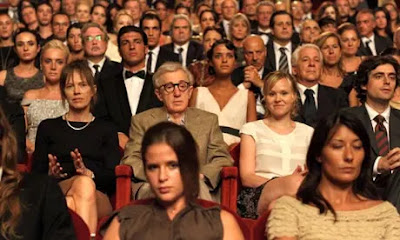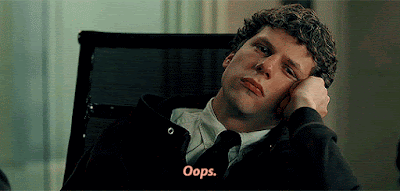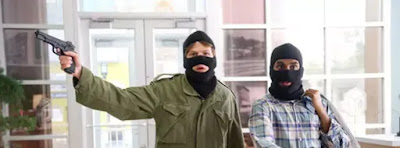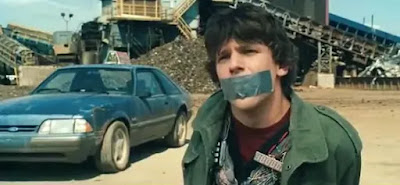You Might Want To Put Down Your Milk-Duds For This One...
or
"If You Love Someone, You Should Shoot 'Em in the Face So They Don't Become a Flesh-Eating Monster."
"Hey! Welcome to Zombieland: Chapter Two!" Columbus (Jesse Eisenberg) chirps at the beginning of Zombieland: Doubletap, the sequel to the hit Zombieland from way back in 2009. "Thanks for waiting!"
Sure thing, Jess.' Sorry what happened to your career in the meantime.
It's great he came back, so that everyone could appreciate what an eccentric live-wire performer he is, given the right part, and how he can energize a movie just by being in it. But, then, Z:D in an exercise in precise nostalgia.
Precise because the things that were established in the first go-'round are repeated: Columbus' "Rules" with their accompanying intrusive 3-D graphics, the credit-scattering Main Title montage, the "Bill Murray" cameo—wait until the very last frame on this one—the splintering of the group and the third act brightly lit night-time zombie-splatter orgy are all in place, just like you remember. That's some comfort food among the grisly fare.
But, also the Zombieland teams are back, the ones both in front of* and behind the camera. That Emma Stone (again playing "Wichita") turned down a big movie to return to the franchise says a lot about her affection for the filmmakers and the actors involved, as her star has risen considerably since that time, even winning an Oscar for La La Land. That says something.
My own reaction to the first Zombieland was an admiration for its fresh take on the well-chewed zombie concept. It helped that the characters in the film are a bizarre family of out-casts who probably wouldn't have anything to do with each other if the world hadn't gone to dead people who want a piece of your mind.

Things haven't changed that much since the zombie apocalypse, other than that Darwin's theory seems to keep working on walking corpses. Either that or the winnowing of zombies makes typing the remaining ones that much easier. What is most troubling is that there are some strata that are tougher to kill, making them tougher to knock down than, say, Star Wars storm-troopers. There aren't many, but it would seem that late-model zombies need more than a simple double-tap to take them down. It doesn't make logical sense, but it does have a tendency to stretch out some of the splatter-fests to be more marathons than short sprints. It's all well and good to increase the challenges to the main characters, but it kind of goes off the proverbial cliff in the third act when the numbers start to increase.

For the four main characters, the issue centers around the wishes of Columbus to impart some stability on their rag-tag band of zomb-busters. He wants to establish a home, as the four—Tallahassee (Harrelson), Columbus, Wichita (Stone) and Little Rock (Abigail Breslin)—have already established a loose-knit family and their identities (they're still following the "no names" rule) are based on their home-towns. So, where's home when society has completely broken down? Well, in the United States, they set up shop at The White House (or "Casablanca" as Tallahassee calls it).That's good for awhile, and everybody gives it a shot. But, we're talking about four alpha-wolves trying to live together in peace and harmony: Tallahassee tries to be a father-figure, Wichita and Columbus try to be a couple—even if she's leery of settling down—and Little Rock is just tired of being around old people and wants to find friends (non-dead kind) her own age.

So, as in the first film, the group splinters—it's not like any of the members can't take care of themselves—sisters Wichita and Little Rock, feeling trapped and wanting freedom, take off, leaving "the boys" to their own devices, if both hurt by their desertion. Tallahassee also starts to feel a bit of wanderlust, wanting to go to Graceland, and Columbus, bitter over Wichita's leaving, runs into another survivor, Madison (a hilarious Zoey Deutsch), who is just as pink and girly-girl as can be. And...well, any port in the zombie-storm. She moves into the White House with Columbus and his "father" (as she calls Tallahassee, to his annoyance), and so, it's a little embarrassing when Wichita comes back to arm up, as Little Rock has run off with a namaste Berkeley pacifist (Avan Jogia)—this enrages Tallahassee ("It's not that I hate pacifists, I just wanna beat the shit outta them!").

So, the dynamic changes a lot. Wichita loathes Madison and despises Columbus for his quick rebound dalliance with somebody else...so..."Madison" after his previous matrimonial-bound devotion ("Wow...just...wow") and the four set off to find Little Rock as there is no way that she can defend herself with a pacifist in tow. With a little difficulty finding the proper vehicle to do their road-trip, they start to track down Little Rock by following the lead where she wants to go—that being Graceland, former domicile of Elvis "The King" Presley.

When they get there, they are disappointed—Graceland is in ruins. But, nearby, they find the stolen Tallahassee-mobile, the Beast, parked outside an Elvis-themed shrine called the Hounddog Hotel. Little Rock had been there. But, exploring the place, they find that though they were there, they've left. But, they're not alone. Fearing they're about to be overrun by zombies, they find themselves assaulted by the Hotel's caretaker, Nevada (Rosario Dawson) to whom Tallahassee is instantly attracted.

It's reciprocated, but then, maybe Nevada is reminded of somebody else—like her current squeeze, a western ruffian named Albuquerque (Luke Wilson), who...kinda...reminds you of Tallahassee and, actually, reminds everybody of Tallahassee, except for (of course) Tallahassee, who takes an instant dislike to the man. And—to make the conceit even more precious, Albs (please don't make me spell it again!) has a nervous, nerdish compadre named Flagstaff (Thomas Middleditch), who Columbus thinks is a really-together guy...with his commandments instead of rules and his unlikely skills at zombie-dispatching. As if knowing they've gone a little too far with the doppelganger bit, the two get eliminated fairly quickly.

There's nowhere the two could go, anyway, it's a silly conceit and the jokes wear out their welcome pretty quickly...plus it eliminates a rival for Nevada's affections and she's pretty necessary to the plot, as everybody moves on to find Little Rock, who has been persuaded by "Berkeley" to find a mythical place called "Babylon," an oasis in the zombie-desert, where there is nothing but peace and harmony and hacky-sack, and no weapons—you just know that that is where the last confrontations in the movie are going to take place, like the big amusement park set-piece in the first one: it raises the stakes for the heroes and gives them a handicap, as well. But, it provides little suspense and hardly any danger. You know that everybody's going to come out of it alright, no matter how much danger is pretended.

Yes, it's fun, more in the smaller moments than in the large ones: you have a lot of really good actors who are enjoying playing their characters, even if they all could be playing better roles, and their idiosyncratic performances are always a pleasure to watch. They manage to evoke pleasure out of recycled materials and make fresh conceits that are beyond their sell-by date. If another Zombieland is made, one knows where it will go—splintering the group again and reforming them with a third act action set-piece. And, no doubt, they'll be just as good even though the vehicle itself will have become as charmless as an animated corpse.
* Zombieland: Doubletap's trailer makes comedic hay of the fact that Harrelson, Eisenberg and Breslin are all Oscar nominees and that Stone is an Oscar winner, juxtaposed with shots of them firing all sorts of weaponry. Hey, Helen Mirren rocks a machine-gun.





















































